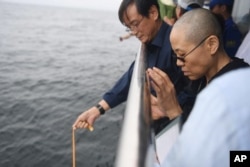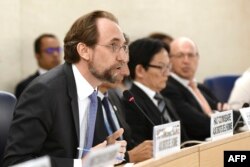U.N. human rights experts urged China on Wednesday to release Liu Xia, the widow of Nobel Peace Prize laureate Liu Xiaobo, and allow her to seek treatment for deteriorating health, including traveling abroad.
The appeal came nearly a year after Liu Xiaobo died of liver cancer on July 13, 2017 while in custody, having been jailed in 2009 for "inciting subversion of state power."
Liu Xia, an artist and poet who suffers from depression, has been under effective house arrest since her husband was awarded the prize in 2010.
She has never been charged with any crime and was last seen in public at his funeral accompanied by Chinese authorities.
"We are disturbed by reports of the deteriorating health of Liu Xia. She is reportedly physically restricted at an unknown location and suffers from severe psychological distress,” U.N. independent experts on enforced disappearances, arbitrary detention, and human rights defenders said in a joint statement.
"We reiterate our call to the Chinese government to disclose her whereabouts and release her," they said.
China has repeatedly said Liu Xia is free and is accorded all rights guaranteed to her by Chinese law.
However, Beijing-based Western diplomats have said she has been closely monitored by Chinese authorities since her husband's death and has only been able to meet and speak to friends and family in pre-arranged phone calls and visits.
A friend who recently spoke to her by telephone said in May that she was losing hope of leaving the country.
In the past, Chinese dissidents have been allowed to leave the country and take up residence in a willing Western nation.
But President Xi Jinping, who came to power in 2013, has presided over a sweeping campaign to quash dissent throughout Chinese society, detaining hundreds of rights activists and lawyers, with dozens jailed.
The U.N. experts voiced alarm at "the growing trend of deaths in custody in China" — who have included activist Cao Shunli in 2014 and Tibetan monk Tenzin Delek Rinpoche in 2016.
Zeid Ra'ad al-Hussein, U.N. High Commissioner for Human Rights, in a speech last month, accused China of preventing independent activists from testifying before U.N. rights bodies.
He voiced concern that conditions were "fast deteriorating" in the autonomous regions of Tibet and Xinjiang.
"A number of Chinese human rights lawyers are in detention or simply disappeared," Alim Seytoff, director of the Uighur service at Radio Free Asia, said at a panel last week.
"The situation of freedom of expression of Uighurs in the northwest of China is even worse," he said.
China, responding to "unfounded accusations" by Western states at the U.N. Human Rights Council, said last week that it encourages activists but "does not allow any organization or individual to engage in subversive or destabilizing activities using the pretext of protecting rights or freedom of speech."
"Meanwhile, the government is cracking down on ethnic separatists and violent terrorists' activities to safeguard national security and protect people's lives and property," Chinese diplomat Jiang Yingfeng told the forum.







